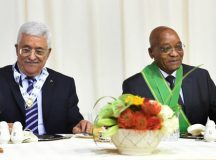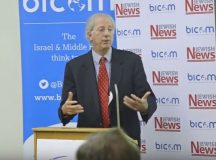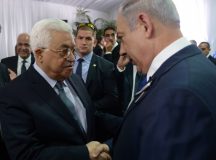Writing exclusively for Fathom, Daniel B. Shapiro, former Ambassador of the United States of America to the State of Israel assesses the 3 May meeting at the White House between Palestinian President Mahmoud Abbas and US President Trump. Shapiro argues that Abbas is ‘going to Washington in a far stronger position than he had any reason to expect’ and should now consider taking two further steps: find a way to signal an end to Palestinian Authority salaries paid to terrorist prisoners and their families and tell the President he is ready to enter talks with Israel without preconditions. If he does he can ‘leave the White House with the best asset any leader can hope for: the President’s support and respect’.
Palestinian Authority President Mahmoud Abbas has been written off so many times — by Israelis, by Arab leaders, by his own people — that he is often described as being politically dead. But like a cat with nine lives, he continues to recover just enough from each setback to retain his relevance for yet another round of Middle East diplomacy.
In President Donald Trump’s election, Abbas was handed a surprising, even shocking opportunity. But the question, as always with Abbas, is whether he will seize this opportunity and use it to try to achieve a breakthrough, or simply dance to avoid having to make historic decisions and shift the blame to Israel.
Abbas heads to Washington for his 3 May meeting with the President in a far stronger position than he had any reason to expect. President Trump campaigned for his office raising serious questions about whether he even viewed a two-state solution as a priority. His election was greeted with rapturous enthusiasm by the Israeli right, who anticipated an end to US opposition to West Bank settlement expansion and the prompt move of the US embassy from Tel Aviv to Jerusalem. Even while actively conducting discussions with numerous foreign governments, the Trump Transition initiated no contact with the Palestinian Authority and ignored Palestinian entreaties.
But the emerging policy of the Trump administration looks quite different, which is to say, quite similar to longstanding US policy. The President has assigned people close to him — his son-in-law, Jared Kushner and his real estate lawyer, Jason Greenblatt to pursue what he has called ‘the ultimate deal’. Greenblatt’s early diplomatic forays drew positive reviews, including from Palestinians, for being open to hearing all sides’ views. US efforts have included pressure on Israel to restrain settlement construction. The embassy move has been put on the back burner. And the President’s confidence (and, some would add, inexperience) is such that he declared last week ‘there is no reason there’s not peace between Israel and the Palestinians – none whatsoever’.
The Trump administration has no interest in a confrontation with Prime Minister Benjamin Netanyahu and the meeting the two leaders held in February was friendly. But many Israeli advocates of settlements or opponents of a two-state solution are quickly growing disillusioned with the President they greeted with such ardor. And Prime Minister Netanyahu, who heads a very right-wing government, is deeply aware of the dilemma he will face if Trump pushes him to take steps his coalition will oppose. In the zero sum calculus of Israeli-Palestinian relations, Abbas can’t help but sense an opening.
But the most significant change that will affect Abbas’ strategy in Washington is the warm start of relations between President Trump and leaders of the key Arab states: Egypt, Jordan, Saudi Arabia, and the Gulf states. On their visits to Washington, the President has showered them with praise as key partners in the campaign against ISIS. Arab leaders are ecstatic about Trump’s tough rhetoric toward Iran and deep skepticism toward the nuclear deal signed by the Obama administration, which were underscored during Secretary of Defense James Mattis’ recent swing through the region. In turn, Washington has advocated a regional approach to reinvigorating Israeli-Palestinian negotiations, in which the Arab states would contribute by making gestures of normalisation toward Israel and encouraging the Palestinians to show flexibility at the negotiating table.
Here, Abbas has played his cards well. Arab leaders, more concerned about the Iranian threat and seeing Israel as a strategic partner facing it, have tended to ignore the Palestinian issue of late. But in the run-up to the Arab League summit in Amman in March, Abbas lined up support for a regional approach, provided the negotiations include ‘a clearly stated timeline to end the conflict on the basis of two states, ensuring the creation of an independent Palestinian state on the June 4, 1967, borders with East Jerusalem as its capital.’ Arab leaders have shown more flexibility in their talks with Washington, but indicated that they can only participate in a process that has a serious prospect of meeting Palestinian needs in a two-state solution.
Abbas, the constant object of jockeying by those who wish to replace him, and in perpetual competition with Hamas, has also sought to reinforce his value as a Palestinian leader committed to non-violence. Gone are the equivocal statements that accompanied (and perhaps encouraged) the wave of stabbing and car ramming attacks of 2015-2016. Abbas has ordered his security commanders to intensify their cooperation with the IDF to ensure that demonstrations, such as those in support of hunger-striking prisoners, don’t get out of hand. He has said nothing to encourage the hunger strikers. Meanwhile, Abbas has chosen this moment to dramatically increase pressure on Hamas, by lowering PA salaries paid to its employees in Gaza and cutting off support for electricity supplies to the Strip.
In short, Abbas is determined to arrive in the Oval Office making the best possible first impression on its new occupant. Whether his goal is truly to advance peace talks, or simply to avoid blame when they fail, this strategy will serve his ends.
But he can’t assume these steps will be enough. President Trump will want more. So Abbas could consider two steps that would even further ensure his good graces with Trump.
First, he should find a way to signal an end to Palestinian Authority salaries paid to terrorist prisoners and their families. The issue has gained new currency in Washington, where the murder of U.S. Army veteran Taylor Force by a Palestinian terrorist in 2016 has galvanised bipartisan Congressional efforts to condition assistance to the Palestinians on an end to these payments. Trump is sympathetic to Palestinian economic needs — it is the only part of the foreign aid budget he does not seek to slash — but Abbas would be smart to give the President something on this issue. It would be even more meaningful precisely because it is a sensitive issue in Palestinian society, and Abbas would be showing courage by doing it.
Second, he should tell the President he is ready to enter talks with Israel without preconditions. Israel, with US support, has always demanded exactly that, while Abbas has usually sought a settlement freeze, prisoner releases, or a commitment to the 1967 lines as a basis for talks before coming to the table. He would impress Trump immeasurably, and shift considerable pressure to Israel, if he would tell the President he is ready to talk. If Abbas can whisper in Trump’s ear, or (dare we dream?) even say publicly that he can recognise Israel as a Jewish state as part of a final package, he will leave the White House with the best asset any leader can hope for: the president’s support and respect.
Is Abbas up to any of this? He has frequently disappointed before, choosing passivity and negativity when it would have served his interests to act otherwise. He and Netanyahu still mistrust each other, and they each face significant domestic political constraints. But a new administration that is respected in the region and new dynamics between regional actors hold within them the potential for surprising progress in the seemingly stalemated Israeli-Palestinian arena. This week will tell us whether that is what Abbas is after.






































Ambassador Shapiro is wonderfully optimistic. If Arafat was unable to accept Israel as the nation-state of the Jewish people, which is what is required for any real peace settlement as it will signal at long last Arab recognition of historical reality, there is zero chance of Abbas doing so. Even a statement that the Jewish Temple was historically located on the Temple Mount, thereby ending what has been called “Temple Denial”, would be an easy first step – but one Abbas cannot take. Tellingly, Shapiro characterizes the current Israeli government as “very right-wing” – yet refrains from characterizing the PA let alone Hamas (without whose buy-in, there is no peace) at all. Had he done so, kleptocratic dictatorship for the PA and Islamist genocidal dictatorship for Hamas would have been more accurate than his characterization of Israel, and more importantly would have identified the fundamental problem in the peace processing system.
Also, while the Arab countries now find it in their interest to warm up relations with Israel in light of the Iranian threat, this calculation is not an indicator of their readiness to accept Israel itself. That would require an overhaul of their educational system and their religious teachings, both of which paint Jews (forget about Israelis) in the worst possible light. If the Arab League were in fact interested in an overall peaceful settlement (as that term is understood in the West), a good initial step is not the re-issuing of their 2002 peace plan, which requires concrete steps by Israel in exchange for vague promises that are easily reversed or not fulfilled, but for the Arab league to repeal its 1959 Resolution No. 1547 (the one that prohibits Arab member countries other than Jordan from offering citizenship to Palestinian Arabs out of concern that they would rapidly lose their “identity” and otherwise restricts their rights) and acknowledge that they will abide by the international definition of “refugee” which does not allow for that status’ inheritability.
As a final point, though there is much more to say, Abbas is not supporting the so-called hunger strikers because he has no interest in supporting his Fatah rival Marwan Barghouti. Abbas does support closer relations with Israeli security because they insure his (and his family’s) survival. Without the IDF, Shin Bet and the rest, Hamas would be in control and Abbas (and presumably Shapiro) knows that perfectly well. The bullet rules over the ballot box.
I would gladly eat my words and see Abbas become a true statesman leading his people toward peace. Sadly, it is far more likely that I will be going hungry for the foreseeable future. Abbas will do nothing of substance and the only question is whether he will be at all held accountable. He hasn’t so far.
Shapiro is wrong! Abbas is politically dead and irrelevant. He is held in power because western powers continue to throw money at him because they are terrified as to who might replace him and Arabs tolerate him because he is the dispenser of those dollars. One thing he can’t do is make peace. In order to make peace the Arabs must hold a long overdue election. Abbas is now in the 12th year of a four year term, to decide if the Arabs even want peace. What if Hamas win? We can finally stop this charade of pretending that peace is just one more Israeli concession away.
Dear Author, Some interesting points. However, a good first step would be for Israel to accept Palestine’s right to exist on the 1967 borders and accept all UN Resolutions (over 150 of them) including UN Security Council Resolutions 476 and 478 which declared that Israel’s “eternal claim” to Jerusalem was NULL and VOID. Another important step would be for Israel to support EU Settlement Guidelines and Settlement Labelling, as well as accept the EU Parliament’s recognition of Palestine in principle. Another forward move would be for Israel to move its monstrous 700 km “wall” to the Green Line separating Israel from Palestine. Israel could then agree with the International Court of Justice, EU and UN about the need not to build an illegal “wall” in Occupied Territory – including in and around Jerusalem. Israel could also end settler only settlements and settler only roads. Israel as a good will measure should also accept the UN Security Council Resolution passed in December of last year. Israel could also accept as over 136 nations have that Palestine is a country and accept as the UN has that Palestine is a UN non-member STATE. If all of the above were accepted then Palestine might be willing to consider a couple of the points the author made.